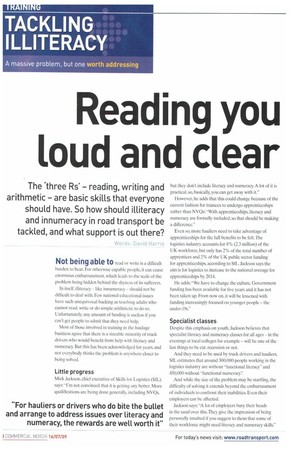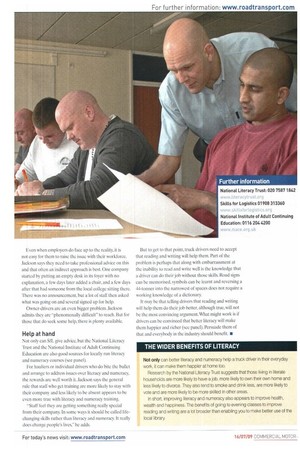Reading you Loud and clear
Page 48

Page 49

If you've noticed an error in this article please click here to report it so we can fix it.
The 'three Rs' reading, writing and arithmetic are basic skills that everyone should have. So how should illiteracy and innumeracy in road transport be tackled, and what support is out there?
Words. David Harris
Not being able to read or write is a difficult burden to bear. For otherwise capable people, it can cause enormous embarrassment, which leads to the scale of the problem being hidden behind the shyness of its sufferers
In itself, illiteracy — like innumeracy — should not be difficult to deal with. Few national educational issues have such unequivocal backing as teaching adults who cannot read, write or do simple arithmetic to do so. Unfortunately, any amount of funding is useless if you can't get people to admit that they need help.
Most of those involved in training in the haulage business agree that there is a sizeable minority of truck drivers who would benefit from help with literacy and numeracy. But this has been acknowledged for years, and not everybody thinks the problem is anywhere closer to being solved.
Little progress
Mick Jackson, chief executive of Skills for Logistics (SfL), says: "I'm not convinced that it is getting any better. More qualifications are being done generally, including NVQs, but they don't include literacy and numeracy. A lot of it is practical, so, basically, you can get away with it."
However, he adds that this could change because of the current fashion for trainees to undergo apprenticeships rather than NVQs:"With apprenticeships, literacy and numeracy are formally included, so that should be making a difference."
Even so, more hauliers need to take advantage of apprenticeships for the full benefits to be felt. The logistics industry accounts for 8% (2.3 million) of the UK workforce. but only has 2% of the total number of apprentices and 2% of the UK public sector funding for apprenticeships, according to SfL. Jackson says the aim is for logistics to increase to the national average for apprenticeships by 2014.
He adds: "We have to change the culture. Government funding has been available for five years and it has not been taken up. From now on, it will be lessened with funding increasingly focused on younger people — the under-19s."
Specialist classes
Despite this emphasis on youth, Jackson believes that specialist literacy and numeracy classes for all ages — in the evenings at local colleges for example — will be one of the last things to be cut, recession or not.
And they need to be used by truck drivers and hauliers. SIT.. estimates that around 300,000 people working in the logistics industry are without "functional literacy" and 450,000 without "functional numeracy'' And while the size of the problem may be startling, the difficulty of solving it extends beyond the embarrassment of individuals to confront their inabilities. Even their employers can be affected.
Jackson says: "A lot of employers bury their heads in the sand over this. They give the impression of being personally insulted if you suggest to them that some of their workforce might need literacy and numeracy skills." Even when employers do face up to the reality, it is not easy for them to raise the issue with their workforce. Jackson says they need to take professional advice on this and that often an indirect approach is best. One company started by putting an empty desk in its foyer with no explanation, a few days later added a chair, and a few days after that had someone from the local college sitting there. There was no announcement, but a lot of staff then asked what was going on and several signed up for help.
Owner-drivers are an even bigger problem. Jackson admits they are "phenomenally difficult" to reach. But for those that do seek some help, there is plenty available.
Help at hand
Not only can SfL give advice, but the National Literacy Trust and the National Institute of Adult Continuing Education are also good sources for locally run literacy and numeracy courses (see panel).
For hauliers or individual drivers who do bite the bullet and arrange to address issues over literacy and numeracy, the rewards are well worth it. Jackson says the general rule that staff who get training are more likely to stay with their company and less likely to be absent appears to he even more true with literacy and numeracy training.
"Staff feel they are getting something really special from their company. In some ways it should be called lifechanging skills rather than literacy and numeracy. It really does change people's lives," he adds. But to get to that point, truck drivers need to accept that reading and writing will help them. Part of the problem is perhaps that along with embarrassment at the inability to read and write well is the knowledge that a driver can do their job without those skills. Road signs can be memorised, symbols can be learnt and reversing a 44-tonner into the narrowest of spaces does not require a working knowledge of a dictionary.
It may be that telling drivers that reading and writing will help them do their job better, although true, will not be the most convincing argument. What might work is if drivers can be convinced that better literacy will make them happier and richer (see panel). Persuade them of that and everybody in the industry should benefit. •




















































































































































